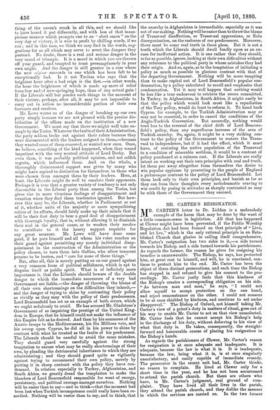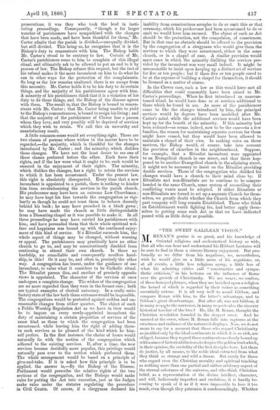MR. CARTER'S RESIGNATION.
MR. CARTER'S letter to Dr. Liddon is a melancholy example of the harm that may be done by the want of a little common-sense in legislation. All that has happened at Clewer might have been prevented, if the Public Worship Regulation Act had been framed on that principle of "Live, and let live," which is the only rational principle in an Esta- blished Church that glories in calling itself comprehensive. Mr. Carter's resignation has two sides to it,—a side turned towards his Bishop, and a side turned towards his parishioners. As regards the former, the reason he gives for resigning his benefice is unanswerable. The Bishop, he says, has protected him, at great cost to himself, and will, he is convinced, con- tinue to protect him to the end. Mr. Carter has been the object of three distinct prosecutions, and each time the Bishop has stepped in and refused to give his consent to the pro- ceedings. Mr. Carter justly feels that this kindness of the Bishop's creates a corresponding obligation on his side. "As between man and man," he says, "I could not allow myself to accept protection on the one hand, and reject remonstrance on the other. I could not consent to be at once shielded by kindness, and continue to act under disapproval." The Bishop of Oxford, not himself taking Mr. Carter's view of a priest's duty in matters of ritual, goes out of his way to enable Mr. Carter to act on that view unmolested. Mr. Carter feels that he cannot accept his Bishop's help in the discharge of his duty, without deferring to his view of what that duty is. He takes, consequently, the straight- forward and honourable course of placing his resignation in the Bishop's hands. As regards the parishioners of Clewer, Mr. Carter's reason for resignation is at once adequate and inadequate. It is adequate, because the law is what it is. It is inadequate, because the law, being what it is, is at once singularly unsatisfactory, and easily capable of immediate remedy. The prosecutor in the recent suit had, Mr. Carter thinks, no reason to complain. He lived at Clewer only for a short time in the year, and he has not been accustomed to attend the parish church. But there are others who have, in Mr. Carter's judgment, real ground of com- plaint. They have lived all their lives in the parish, they attend the parish church, and they dislike the manner in which the services are carried on. In the two former prosecutions, it was they who took the lead in insti- tuting proceedings. Consequently, though a far larger number of parishioners have sympathised with the changes that have been made, and have been thankful for them," Mr. Carter admits that the parish is divided,—unequally divided, but still divided. This being so, he recognises that it is the Bishop's duty to remonstrate with him. The Bishop holds Mr. Carter's ritual to be contrary to law. Certain of Mr. Carter's parishioners come to him to complain of this illegal ritual, and ultimately ask to be allowed to put an end to it by process of law. The Bishop refuses this request, but the fact of his refusal makes it the more incumbent on him to do what he can in other ways for the protection of the complainants. So long as the law remains unaltered, there is no escape from this necessity. Mr. Carter holds it to be his duty to do certain things, and the majority of his parishioners agree with him. A minority of his parishioners think that it is a violation of his duty to do these things, and the Bishop of the diocese agrees with them. The result is, that the Bishop is bound to remon- strate with Mr. Carter ; that Mr. Carter being unable to yield to the Bishop's remonstrances, is bound to resign his living ; and that the majority of the parishioners of Clewer lose a parson whom they love, and very possibly will be deprived of services which they wish to retain. We call this an unworthy and unsatisfactory result.
A little common-sense would set everything right. There are two classes of persons whose wishes in the matter have to be regarded,—the majority, which is thankful for the changes introduced by Mr. Carter ; and the minority, which dislikes these changes. We have not the least desire to see one of these classes preferred before the other. Each have their rights, and if the law were what it ought to be, each would be ensured in the enjoyment of their rights. The minority, which dislikes the changes, has a right to retain the services to which it has been accustomed. Under the present law, this right is absolutely disregarded. Every time that a new incumbent is appointed to a parish, there is nothing to hinder him from revolutionising the services in the parish church. His predecessor may have been an extreme Low Churchman ; he may have kept his face towards the congregation as vigi- lantly as though he could not trust them to behave decently behind his back ; he may have preached in a black gown ; he may have made the church as little distinguishable from a Dissenting chapel as it was possible to make it. In all these proceedings he may have carried his parishioners with him, and have persuaded them that their whole spiritual wel- fare and happiness was bound up with the continued enjoy- ment of this kind of service. If a Ritualist succeeds him, the whole aspect of things may be changed, without warning or appeal. The parishioners may practically have no other church to go to, and may be conscientiously disabled from continuing to attend their own church. Is there no hardship, no remediable and consequently needless hard- ship, in this ? Or it may be, and often is, precisely the other way. A congregation has learnt, under the guidance of one incumbent, to value what it considers to be Catholic ritual. The Ritualist parson dies, and another of precisely opposite views is appointed. The character of the services at once undergoes a complete change. The wishes of the congregation are no more regarded than they were in the former case ; both are typical examples of clerical autocracy. In a really satis- factory state of the law both these extremes would be impossible. The congregations would be protected against sudden and un- reasonable changes from either quarter. The object of such a Public Worship Regulation Act as we have in view would be to impose on every newly-appointed incumbent the duty of maintaining a certain proportion of services of the same kind as those to which the congregation had been accustomed, while leaving him the right of adding there- to such services as he pleased of the kind which he him- self prefers. In the first instance, the choice of hours would naturally lie with the section of the congregation which adhered to the existing services. If, after a time, the new services became decidedly more popular, this privilege would naturally pass over to the section which preferred them. The whole arrangement would be based on a principle of give-and-take. If it is asked how this principle is to be applied, the answer is,—By the Bishop of the Diocese. Parliament would prescribe the relative rights of the two sections of the congregation, and the Bishops would make rules for putting the Act into execution, just as the Judges make rules under the statutes regulating the procedure in Civil Courts. Of course, if a clergyman declared his inability from conscientious scruples to do or omit this or that ceremony, which his predecessor had been accustomed to do or omit we would have him excused. The object of such an Act should be the protection, not the compulsion, of consciences. But in that case no obstacle should be offered to the provision by the congregation of a clergyman who would give them the services to which they were accustomed, either in the same church, or in a chapel of ease. A similar provision would meet cases in which the minority disliking the services pro- vided by the incumbent was very small indeed. It might be unreasonable to insist upon keeping up a distinct set of services for five or ten people ; but if these five or ten people cared to be at the expense of building a chapel for themselves, it should be licensed as a matter of course.
In the Clewer case, such a law as this would have met all difficulties that could reasonably have been raised to Mr. Carter's proceedings. When he first introduced an unaccus- tomed ritual, he would have done so at services additional to those which he found in use. As more of the parishioners came to like the changes introduced by him, the principal services would by degrees have been modelled after Mr. Carter's mind, while the additional services would have been kept up for the benefit of the minority. If this minority bad been reduced—as seems, indeed, now to be the case—to a few families, the reason for maintaining separate services for them might have ceased, but they would have been allowed to maintain a chapel of their own. In making rules on these matters, the Bishop would, of course, take into account the provision of churches in the neighbourhood. Suppose, for example, that a Ritualist incumbent were appointed to an Evangelical church in one street, and that there hap- pened to be another Evangelical church in the adjoining street, it might not be necessary to insist on the Ritualist providing double services. Those of the congregation who disliked his changes would have a church to their mind close by. If Ritualists and non-Ritualists are to continue to be compre- hended in the same Church, some system of reconciling their conflicting wants must be adopted. If either Ritualists or non-Ritualists are forced to set up a separate Church for them- selves, we greatly doubt whether the Church from which they part company will long remain Established. Those who think an Establishment worth fighting for, had better apply them- selves to getting some such Act as that we have indicated passed with as little delay as possible.



































 Previous page
Previous page